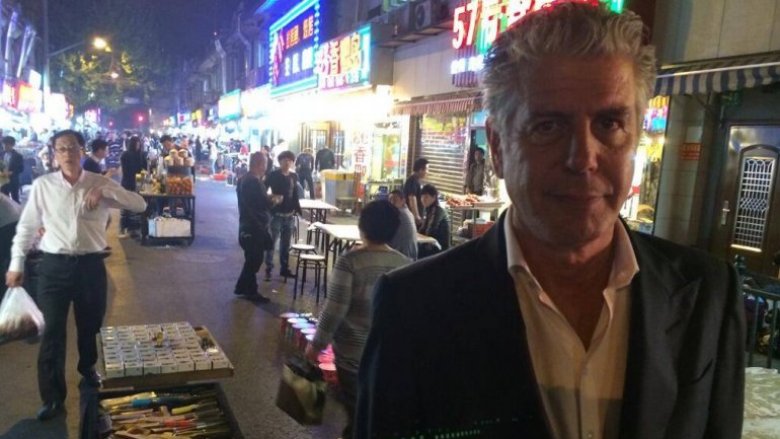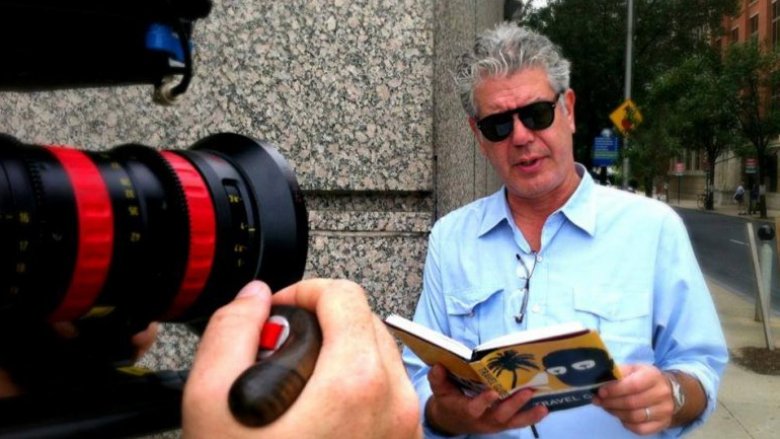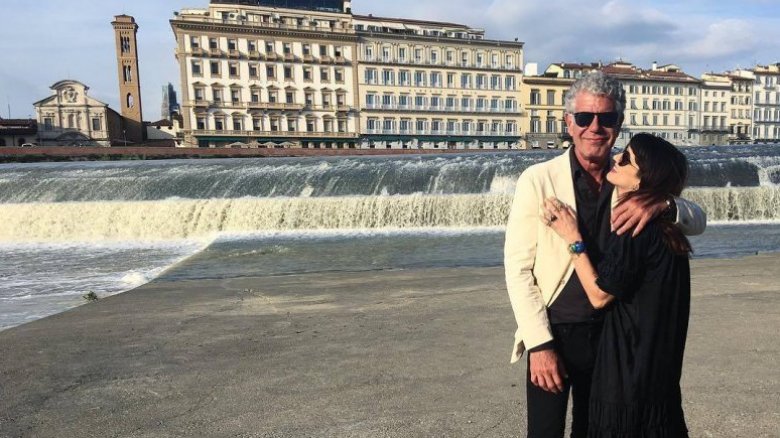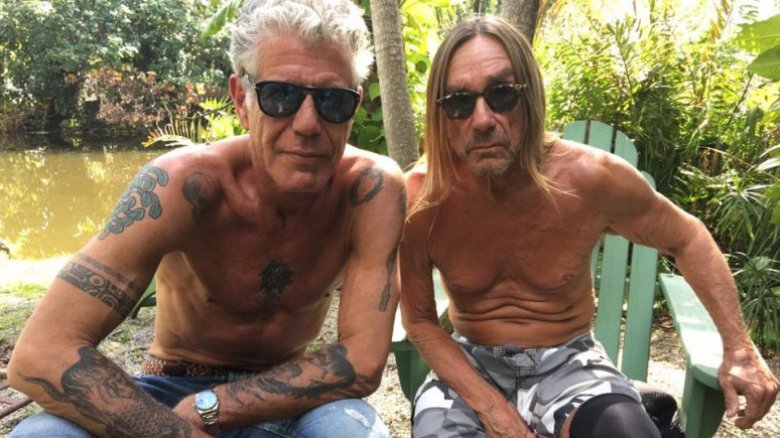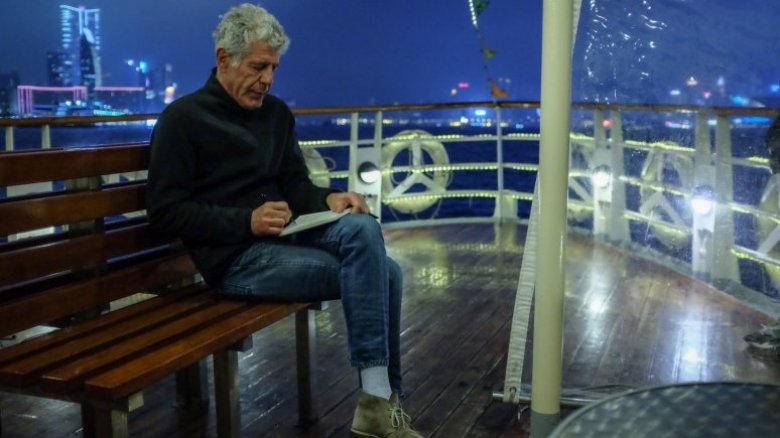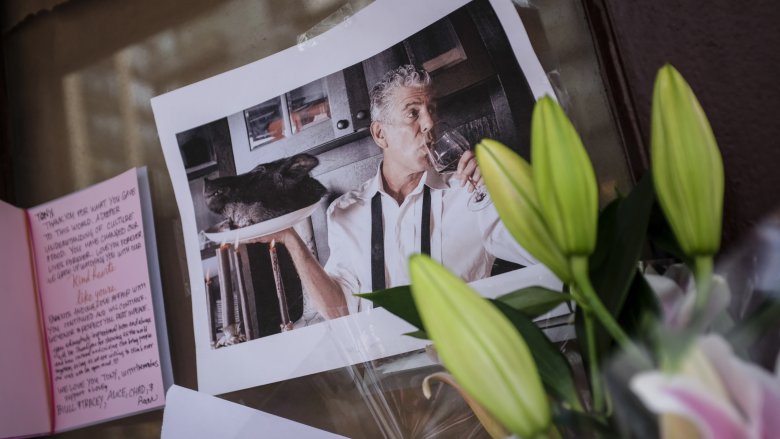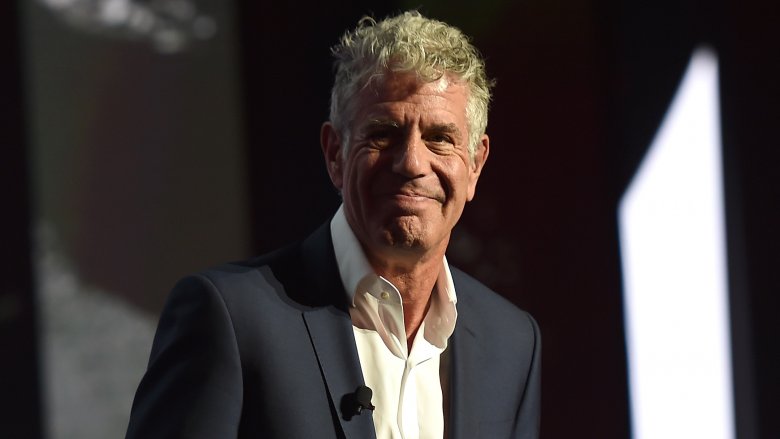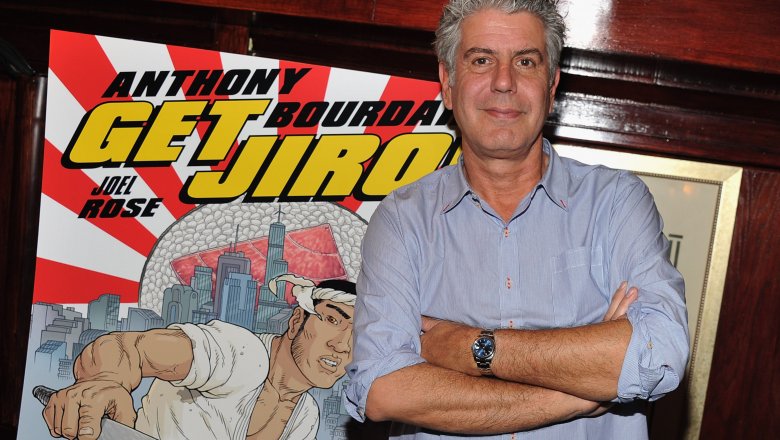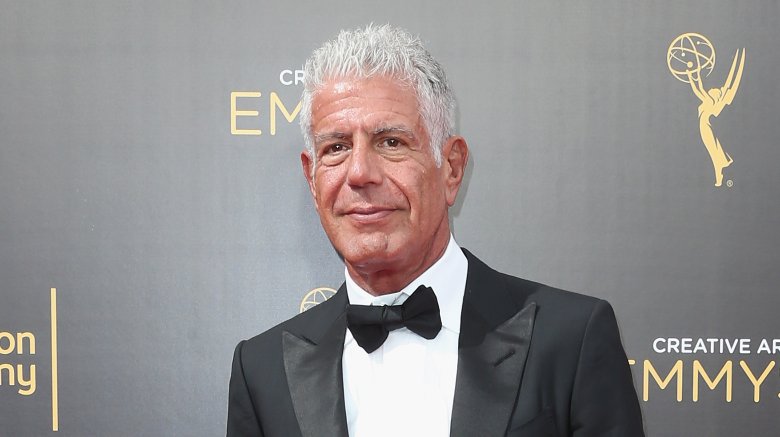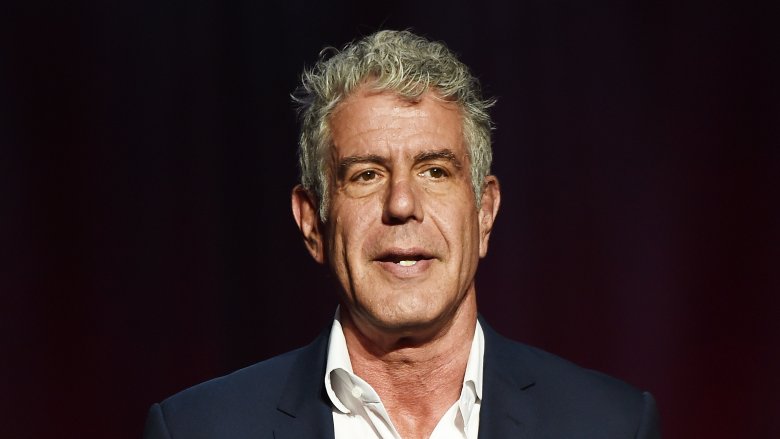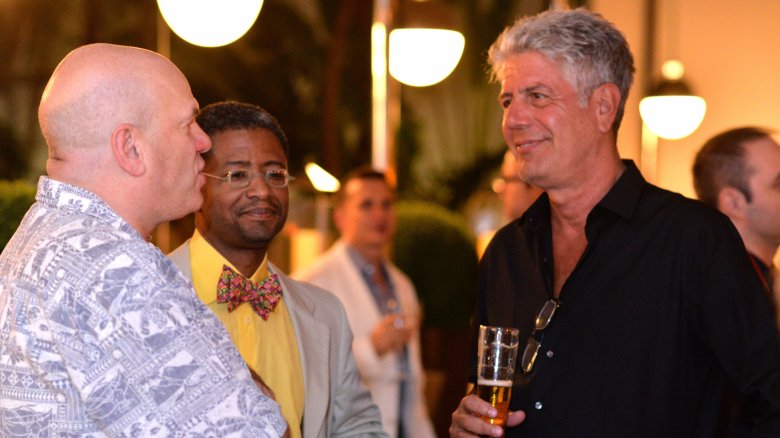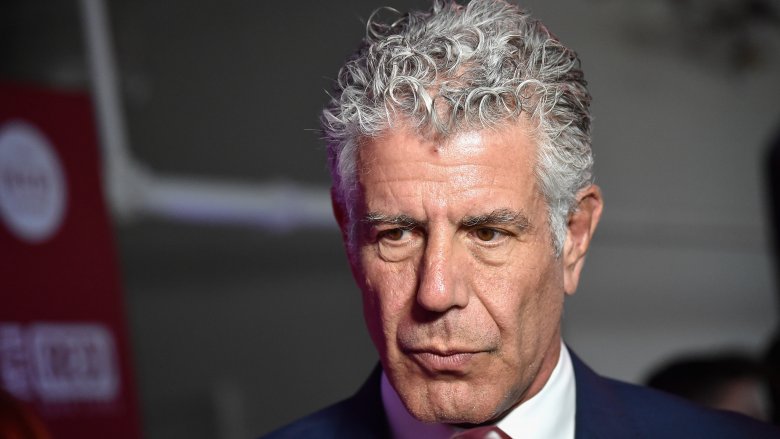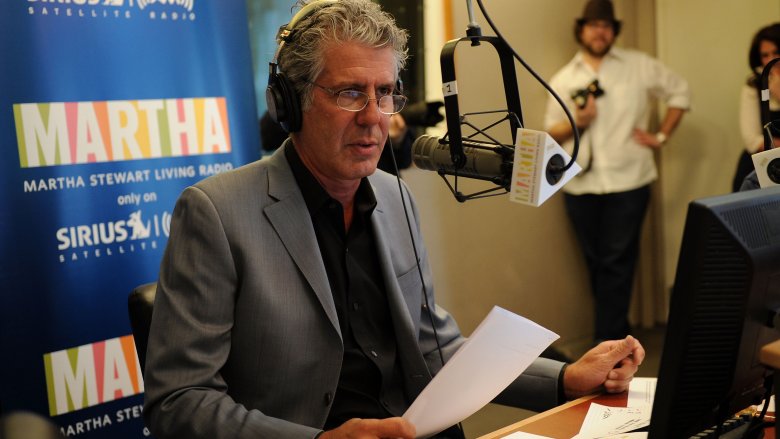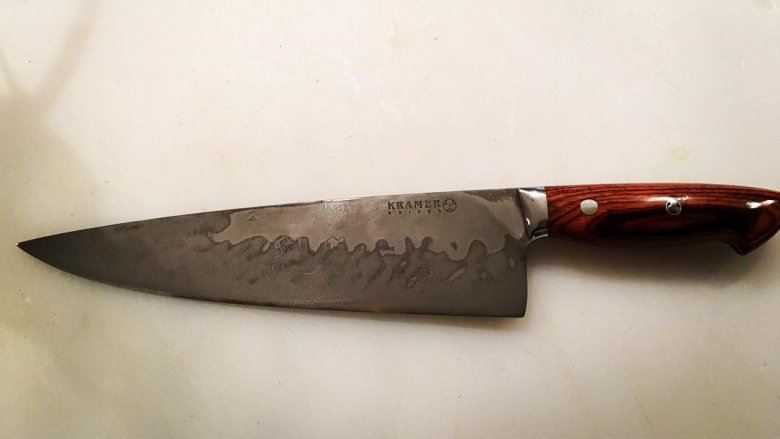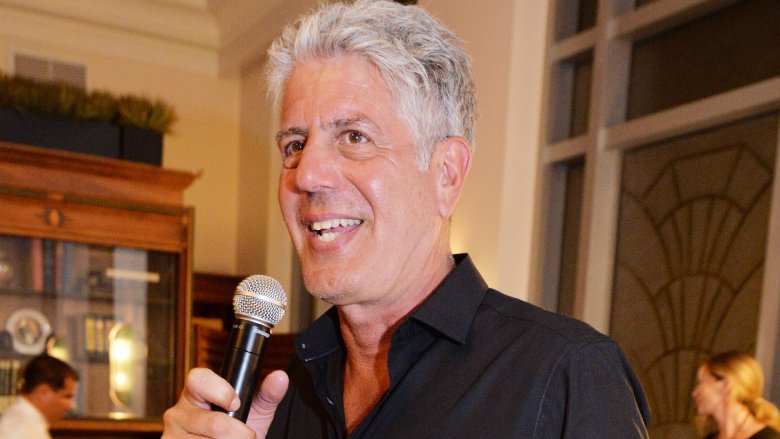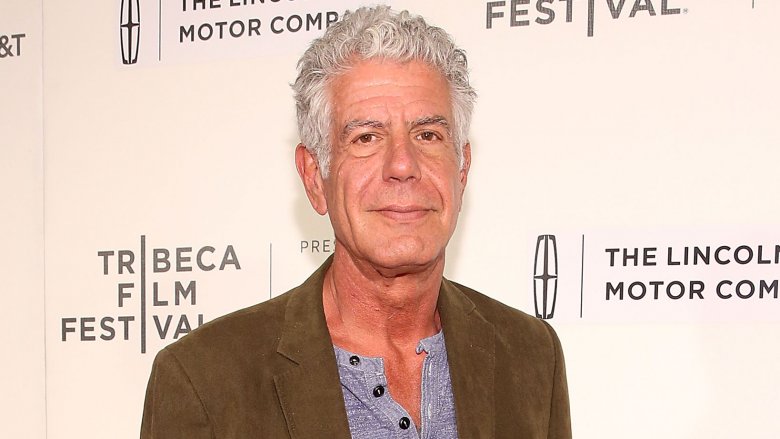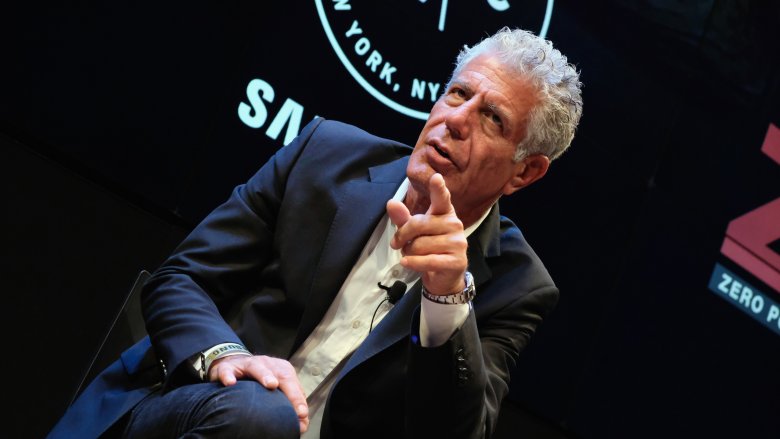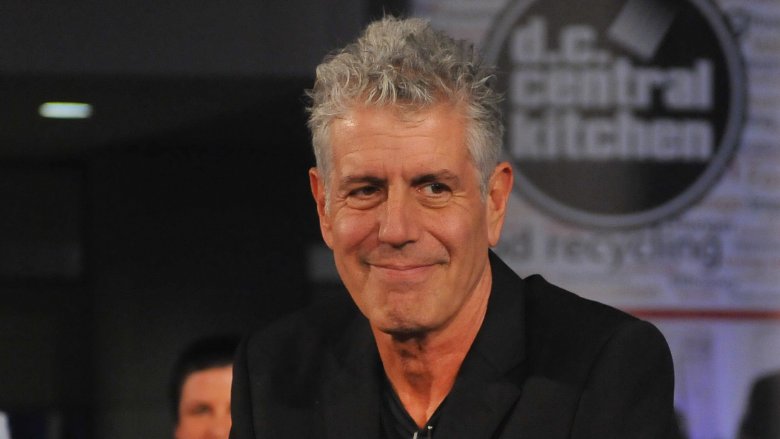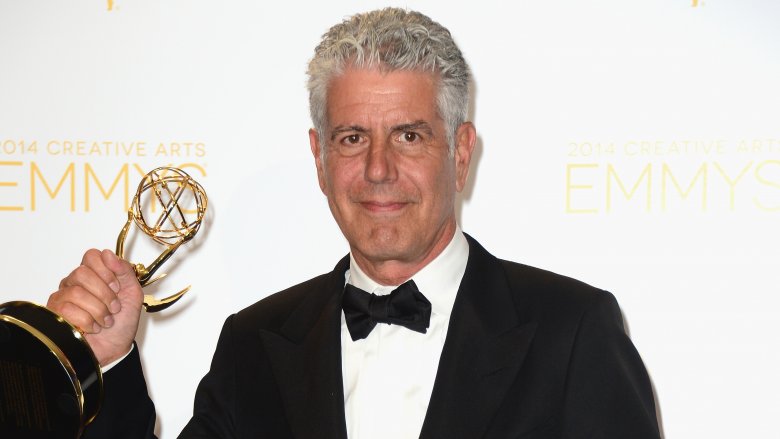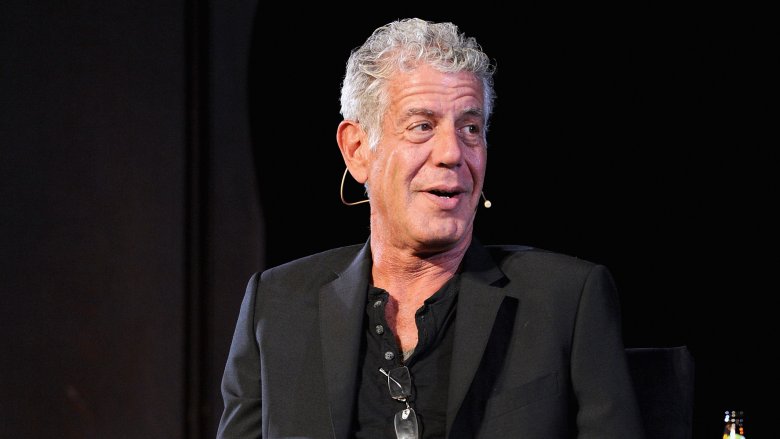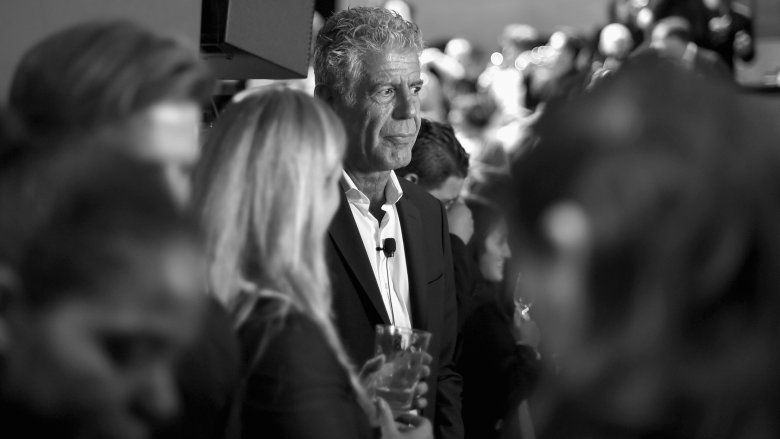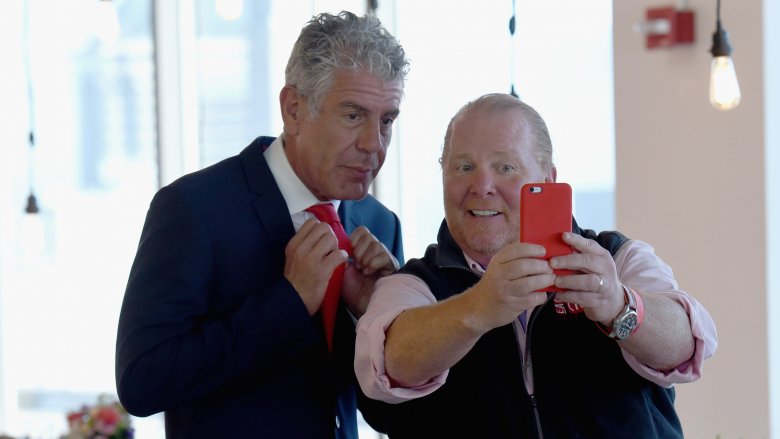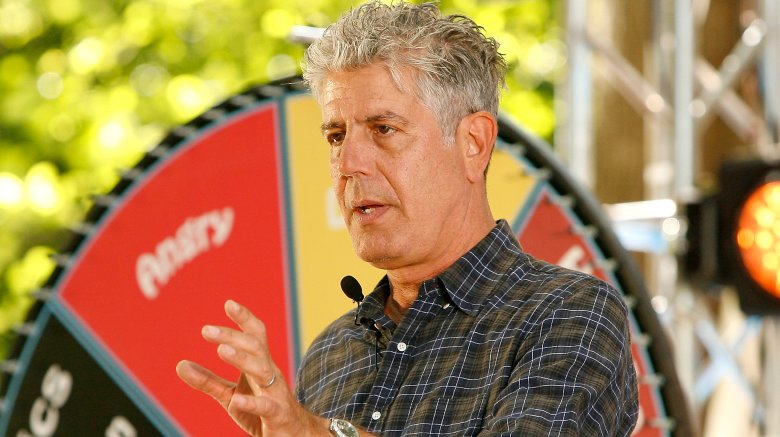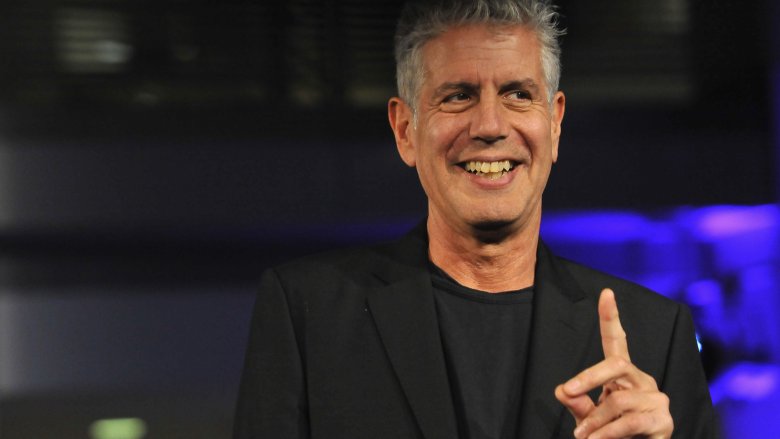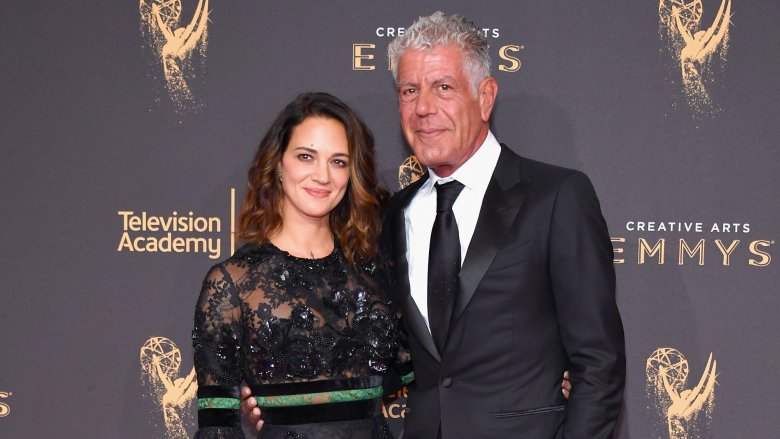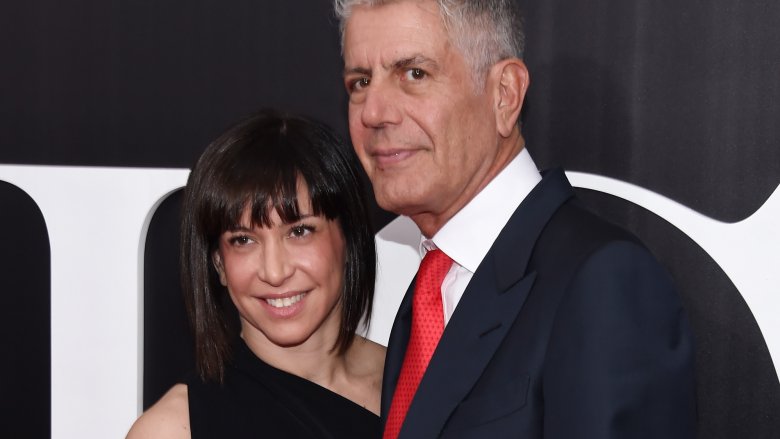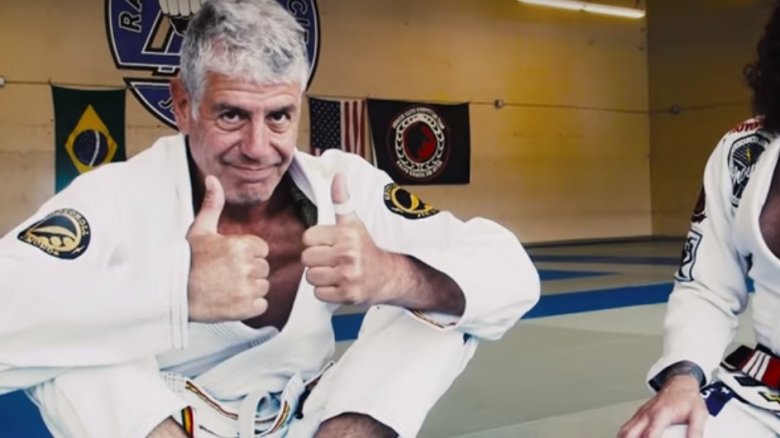The Untold Truth Of Anthony Bourdain
The culinary world was shook to its core when it was announced on June 8, 2018 that celebrity chef Anthony Bourdain had passed away at age 61 of an apparent suicide.
Arguably one of the more sardonic chefs out there, Anthony Bourdain established himself as a multi-faceted and world-traveled aesthete with a deep affection for food, community, and regional traditions — and a collection of major pet peeves and deep-seated opinions that he wasn't afraid to share with the world at large. But he wasn't always known for being an intellectual silver fox who hobnobs with President Obama over a beer, or for being cool enough to call Iggy Pop a personal friend. And he wasn't always the most respected man in the kitchen. That took years of hard work and cultivation, and long hours spent cooking, thinking, and writing. As we mourn for the loss of America's favorite bad boy chef, here are some parts of Anthony Bourdain's story you might not know.
If you or anyone you know is having suicidal thoughts, please call the National Suicide Prevention Lifeline at 1-800-273-TALK (8255).
Anthony Bourdain didn't have the fortune you'd expect
"When the contents of Anthony Bourdain's will were made public, it came with a surprise: even though estimates put his net worth at somewhere around $16 million, his will totaled only $1.2 million, which is peanuts when it comes to celebrity wealth. The difference may just be down to sensible inheritance planning, with Variety reporting that Bourdain had also placed assets in a trust, which doesn't have to be disclosed publicly. However, the chef himself once told Wealthsimple that "reports of my net worth are about ten times overstated. I think the people who calculate these things assume that I live a lot more sensibly than I do."
When Vanity Fair interviewed some of the fixers that accompanied Bourdain on all of his trips, they not only agreed that he was "very modest, very cautious," but that every penny of every budget counted. They say he was only able to open a savings account when he was 44 years old, and that he traveled in the same van as the rest of his team and stayed in places that were closer to the description of a dive than of a five-star hotel. Some rooms, they remembered, were so small there was barely room for luggage.
Bourdain left most of his money to his daughter, Ariane Busia-Bourdain.
The fame was wearing on Anthony Bourdain
No one quite knew Anthony Bourdain like those who traveled to the farthest reaches of the globe with him. When Vanity Fair interviewed the fixers who had gotten him interviews, seats at family dinner tables, and the opportunity to film the most intimate moments of families' lives, they all echoed this sentiment from Michiko Zentoh, his first fixer in Japan: "Tony didn't do fake."
But they also agreed that as he got more and more popular and started to be recognized, something was changing. Zentoh described it like this: "The whole experience was like a goose being made into foie gras. Tony had no time to digest anything..."
By the time he moved to CNN, those who worked with him could see that the fame, and the rush to get the shots — instead of spending time getting to know the people behind the food — were making him miserable. Fixer Alex Roa said he no longer went out at night with the crew, that he opted for room service alone, and that the final bright light was the Hong Kong episode directed by girlfriend Asia Argento. There, they say, he was happy.
The truth behind the Anthony Bourdain and Asia Argento cheating rumors
After Anthony Bourdain's suicide, social media and the headlines weren't just mourning the loss of one of television's most down-to-earth stars, they were also pointing fingers and asking the question we all ask when we lose someone we love: "Why?"
According to CBS News, one of those targeted as the answer to that question was Bourdain's girlfriend, Asia Argento. Just days before Bourdain's death, photos were taken of Argento with another man — and conclusions were drawn. When she spoke out against the accusations, though, it wasn't with denial she had been cheating, but denial that anything is ever that cut-and-dried, and that outside observers can truly know what happens between two people.
"People say I murdered Anthony Bourdain. I cheated on him — but he cheated on me, too. It wasn't a problem for us. But I understand the world needs to find a reason. I would like to find a reason, too. I don't have it. Maybe I would feel some solace in thinking there was something that happened."
Argento seemed to be saying the two had an understanding, adding, "He was a man who traveled 265 days a year when we saw each other we took really great pleasure in each other's company. But we are not children. We are grown-ups."
The sad, nostalgic truth of Anthony Bourdain's final episode
When the last episode of Parts Unknown finally aired, it was equally bittersweet and surprising. It featured a retrospective Anthony Bourdain going back to his own stomping grounds in the Lower East Side of New York City, a place that was — in his formative years — run by the punk rockers, the artists, and the drug dealers. It was the seedy underbelly of the city, and as he pointed out the street corners where he bought drugs and the alleys no one dared to go down, it provided a poignant glimpse into his psyche.
Esquire says the episode explained a lot about Bourdain, including how music — particularly punk rock — influenced the way he spoke, wrote, and thought. They describe the episode as featuring him more as a character than an observer, saying (via Quartz) that he knew the dope houses "by order of preference," and when he spoke of the bond shared by the people who lived and grew up there during the 1970s, he said, "cheap rents brought a lot of people together." It's a surprisingly intimate look at not just the area, but his life, and everyone agrees: it's a fitting farewell.
Anthony Bourdain was remembered as quiet and shy
Everyone who ever saw Anthony Bourdain on television or heard him speak formed a very clear picture of him: erudite and slightly bohemian, well-spoken and able to find those things that would allow him to connect with anyone, anywhere. But several months after his death, GQ talked to some of the people who had known him best — and they painted a very different picture of who he actually was.
Sam Goldman was a childhood friend, and he remembered Bourdain as a tiny kid who got picked on... "just a bit." Goldman remembered, "The first Friday of our ski-club trips, we made him ride in the luggage rack."
Chris Collins, the TV producer that worked with Bourdain to develop No Reservations and Parts Unknown, also said that his on-screen persona was nothing like the real person. Their first outing — to Japan — was a nightmare, mostly because Bourdain "did not engage with us. He would not acknowledge our presence..." and that he was very, very shy. That only changed in Vietnam, where he found an "instant cultural touchstone" that brought him out of his shell.
Anthony Bourdain spoke about his depression... discreetly
Anthony Bourdain carried a lifetime of demons with him, and past interviews hinted at the depths of Bourdain's depression, especially one with a therapist filmed for a 2016 episode of Parts Unknown (via Metro).
While filming, he sat down with a therapist and described how insignificant things — he mentioned something as simple as an airport hamburger — could trigger "...a spiral of depression that can last for days."
"I feel kind of like a freak and I feel kind of isolated," he said, and it wasn't the only time he hinted at the darkness. In a 2017 interview with The Guardian, he spoke briefly of his "psychotic rage", saying, "I was an unhappy soul... I hurt, disappointed, and offended many, many, many people, and I regret a lot. It's a shame I have to live with."
Anthony Bourdain wrote a series of crime thrillers
It was Kitchen Confidential that kicked open the door to the culinary landscape, but Anthony Bourdain had already released a number of books of a very, very different sort: crime fiction.
He started with A Bone in the Throat, which has his main character — unsurprisingly, a chef — getting mixed up in Little Italy's criminal underworld. That was followed by Gone Bamboo, and later by The Bobby Gold Stories. He told The New York Times (via Vulture), "Crime as work appeals to me... The guy who gets up in the morning and makes his living by crime. I've always been a crime buff and a big fan of crime jargon, and in the restaurant business, I've met a bunch of gangsters."
It was just one more thing he was extraordinarily good at — so good Esquire calls his Bobby Gold collection one of their must-read Bourdain books.
Anthony Bourdain was serious about comic books
It's hard to imagine anyone with Anthony Bourdain's stature having dreams of doing something else with his life, but when Vulture spoke with Karen Berger, editor and founder of DC Comics' Vertigo, it quickly became clear it wasn't food that was his first love: it was comics.
Berger worked with Bourdain on his graphic novel series Get Jiro!, which was followed by Hungry Ghosts. She remembered that he had been a massive fan of some of the darker, underground comics that had been circulating for decades. It was the happiest she'd ever seen him, she said, and added, "He always had a bristle at [...] the celebrity chef stuff. He wanted to be known as a writer as long as I knew him."
far back as the 1970s, Bourdain had tried his hand at both writing and illustrating graphic novels, but the publishers he approached told him he just wasn't good enough as an artist. He didn't give up, though, and ultimately gave the world some seriously sinister, brilliant work.
Anthony Bourdain refused to film in Switzerland
Fans have seen Anthony Bourdain in some of the most dangerous places in the world, filming through war and conflict while still standing on the front lines to get the story. He's been all over, but there's one place he admitted he was so terrified of, he refused to film there. It's the last country anyone would ever guess, too: Switzerland.
Bourdain talked to Conan O'Brien about the fear he said was really pretty inexplicable, but no less real.
"I have a morbid fear of everything Swiss," he said, going on to specify that it was even the most beautiful, seemingly harmless things about Switzerland — Alpine vistas, hats with feathers, Lake Geneva, cuckoo clocks, and Swiss cheese — that terrified him. Why? He said he supposed he had a repressed memory involving The Sound of Music, but honestly had no idea why he was so very afraid of all things Swiss.
Anthony Bourdain's adventurous taste started as a rebellious phase
Anthony Bourdain did not emerge from the womb with a charcuterie platter in his right hand and a dirty martini in the left. He actually came from relatively humble origins in New Jersey, where he was raised on standard American cuisine like meatloaf and burgers. But he was intrigued by the smells that would drift upstairs to his room when the adults were hosting dinner parties downstairs. And when his family traveled abroad, his curiosity only grew. He told The Guardian that he responded to being left out of adult dinners by his parents with a culinary rebellion of sorts. "I reacted by requesting oysters and dishes they found repulsive and becoming increasingly adventurous in my tastes. It wasn't about the food but about getting a reaction." So his sophisticated, adult palate had its origins in the angsty cravings of a cranky kid.
Anthony Bourdain didn't drink at home
If you've watched Anthony Bourdain drink his way around the world on Parts Unknown, you might be inclined to think that he hit the bottle on a regular basis. But surprisingly, he didn't guzzle cases of beers on Friday nights, or even have wine with dinner. Rather, he just didn't drink at home. He told Men's Journal, "You see me drink myself stupid on my show all the time. And I have a lot of fun doing that. But I'm not sitting at home having a cocktail. Never, ever. I don't ever drink in my house." Instead, he prefered to keep his home life separate from his carousing, professional life. He continued, "When I indulge, I indulge. But I don't let it bleed over into the rest of my life."
The food Anthony Bourdain loved... and hated
Anthony Bourdain sampled cuisines and dishes from all over the world, but according to what he admitted in his IAmA Reddit, there was one thing that kept him coming back.
"I have an unholy and guilty attraction to fast-food macaroni and cheese... There, I admit it."
What else did he love? He told SBNation he was a devoted fan of Shake Shack, would always choose In-N-Out over McDonald's (which he never went to), said he hated Iceland's rotten shark dish (but still ranked it alongside a McNugget when it came to disgustingness), and would always find a KFC if he needed some good old American comfort food while he was travelling.
They also asked him if he would be opposed to trying human flesh. His answer? "Not knowingly. I mean, I'd really like to avoid that, but look, if we're in a lifeboat... we're three weeks at sea, I've got no problem."
Anthony Bourdain despised food trends
Anthony Bourdain had a reputation saying exactly what he was thinking, and that was definitely true when it came to the world's food trends.
When he did an IAmA Reddit and someone asked him what food trends he thought needed to end, he said, "I would like to see the pumpkin spice craze drowned in its own blood. Quickly."
He also took aim at juice cleanses, overuse of the word "artisanal," gluten-free foods for people who didn't have a legitimate medical issue with gluten, and overly judgmental beer snobs and baristas. "I mean, I like a good craft, but don't make me feel bad about my beer choices."
Given Bourdain's stance on equality, it's not surprising he told SBNation he wasn't a fan of the so-called "bro-food." "I don't even know what it is, but I'd like to stop it. I hate that whole idea that there's male food and female food. ... that doesn't reflect well on the male species."
Anthony Bourdain's most treasured possession
Anthony Bourdain had an undeniable love for the passion of the artisan and for the hand-crafted, and focused on those sorts of unsung artisans during his Raw Craft series. It wasn't just about the kitchen, either — he spoke with people from blacksmiths and cobblers to typographers (via QZ), and wanted his foodie followers to embrace other kinds of artistry.
Not surprisingly, when he did his IAmA Reddit, someone asked him if he got to keep the knife Bob Kramer made in the first series. He didn't take that one home with him, even though he did bid on it when it went up for auction. After saying it went for well beyond his price range — more than $22,000 — he was determined to get one of his own. After waiting more than a year, he did finally get to buy one he could actually take home. "It is easily my most valued physical object that I own. It is a thing of beauty, and I'm just waiting for... food worthy of it, to use it."
Anthony Bourdain had a disdain for brunch
Although brunch is more popular in America today than it's ever been, especially in Anthony Bourdain's home state of New York, he just wasn't into it. That was due mostly to the many years he spent slinging brunch in restaurant kitchens, sometimes at his lowest points. He told Fresh Air that at times, "it was the only work I could get. And I came to hate the — you know, when you're cooking 300 omelets a day and, you know, scraping waffles out of the waffle iron and making French toast and pancakes and, you know, cooking hundreds of pounds of home fries, those smells, those associations, those were very painful times — you know, addiction, post-addiction." Clearly he did not cherish those memories. He continued, "You know, I was a desperate man, often working under a pseudonym when I was cooking brunch. So I really hated it. And I also hated the whole concept of brunch."
Anthony Bourdain didn't fry his bacon
Anthony Bourdain always had his own way of doing things in the kitchen, and that was true even with the simplest of tasks. Unless you've picked up a copy of Anthony Bourdain's newest cookbook Appetites, you might be surprised to learn that he didn't prepare bacon by frying it. Rather, in an unorthodox move, he preferred to roast it in the oven. This came as a surprise to Dave Davies during a Fresh Air interview, when Bourdain said that frying is, "just not the best way to evenly cook bacon. We all like — most of us like crispy bacon or at least evenly cooked. And the best way to do it in my experience and the way we always did it in restaurants was to lay it out on a baking parchment and put in the oven and cook patiently but evenly, turning occasionally because there are hotspots in ovens." Always quick with a joke, Bourdain warned of the perils of frying bacon, which can be dangerous "particularly if you're naked, never fry bacon while naked."
Anthony Bourdain's first job was as a dishwasher
Anthony Bourdain cut his teeth in the restaurant business as many people do, standing in front of a sink full of dirty dishes and hot water. And whereas that kind of backbreaking work isn't for everyone, Bourdain found a real sense of purpose in it, and subsequently stuck with it. At the time, he was a self-professed "shy, goofy, awkward teenager" as he told The Guardian, and this was the first instance in which he was given a job that made total, objective sense to him. And the ability to perform the job well, accomplishing any tasks given to him within the job description, allowed him to flourish under the tutelage of people he both respected and admired. It makes sense that he stuck around after that.
A trip to Japan changed Anthony Bourdain's life
The list of countries that Anthony Bourdain travelled to is impressive, covering all seven continents. But he did do a bit of travel before he became a famous chef who globetrots for a living. So what was it that made him want to do more in life and see more of the world? Bourdain told Men's Journal that his "first trip to Japan — a couple of years before Kitchen Confidential — was absolutely life changing. It was like my first acid trip. It was that mind-expanding and climcatic [sic]." That's because he was able to see the world in an entirely new way. He continued, "I went there thinking there were a certain amount of primary colors. I came back knowing, in fact, there were 10 or 12 more. It made me want to do things. It showed me there was so much more in the world than I had any idea about — there was so much to learn and there was so much stuff out there." That's proof that travel can indeed be transformative.
Kitchen Confidential gave Anthony Bourdain his big break
Everything changed for Anthony Bourdain when his first cookbook Kitchen Confidential was published, catapulting him out of the world of kitchen obscurity and into the world of celebrity. The book, which was credited with revolutionizing the entire genre of food writing, was so well-received that he no longer had to slave in a kitchen for 12 or more hours every day.
So how did the book come to be? It started when he wrote a short piece inspired in part by George Orwell, and in part by his chef lifestyle. He told Fresh Air, "I just wanted to write about my life from the point of view of a working journeyman chef of no particular distinction, honestly." And that writing caught the attention of the New Yorker, who published the piece a short time later, which set everything in motion. He continued, "I had a book contract — a book deal within days. And when the book came out, it very quickly transformed my life — I mean, changed everything."
Anthony Bourdain wasn't successful until his 40s
It's hard to look at videos of Anthony Bourdain noshing at Noma and imagine him struggling to pay his bills or scrounging for rent money. But he spent years busting his hump in the kitchen, worrying if he'd be able to get by. He told Biography that at age 44, he was "standing in kitchens, not knowing what it was like to go to sleep without being in mortal terror. I was in horrible, endless, irrevocable debt. I had no health insurance. I didn't pay my taxes. I couldn't pay my rent." But that did change for him. He continued, "It was a nightmare, but it's all been different for about 15 years. If it looks like my life is comfortable, well, that's a very new thing for me." Clearly those long, uncertain years left their mark on him.
Lebanon re-routed Anthony Bourdain's career
Anthony Bourdain headed to Lebanon in 2006, at the same time then-BBC reporter Kim Ghattas was there covering the conflict (via The Atlantic). Instead of filming what he thought was a city emerging as the "party capital of the Middle East," he found himself on the front lines of war. There were bombs, military jets, and a lot of terror, ultimately ending in the crew's emergency evacuation.
He was nominated for an Emmy for the piece, which focused on the people caught in the conflict. Later, he would cite that as a defining moment in his career. It was the trip when he saw a city and a people torn by conflict, while still managing to hold onto the possibilities they would be something more. That was the moment that made him want to tell the stories of the people behind the headlines, and ultimately make Parts Unknownhttps://www.mashed.com/125775/the-untold-truth-of-anthony-bourdain-parts-unknown/. "Hopefully," he noted in one interview, "you will come back smarter about the world."
If you or anyone you know is having suicidal thoughts, please call the National Suicide Prevention Lifeline at 1-800-273-TALK (8255).
Anthony Bourdain softened in some of his feuds
There are a few choice things Anthony Bourdain was known for, and feuding with other celebrity chefs was one of them. He threw down on everyone from Bobby Flay to Rachel Ray, leveling his peers with colorful and profane barbs. But in recent years it seemed that Bourdain might be calming down a bit, spending less time trash talking and more time focusing on his own work. For one, some of his more recent insults of his number one foe, Guy Fieri, were tamer than those of years past. And he'd been mum about Paula Deen for some years now, which is a huge change in tack from his previous, soul-eviscerating critiques of her. He even headlined a festival with Emeril Lagasse in January of 2017, showing that he had calmed in that regard too.
Anthony Bourdain was passionate about food waste
As a rule, Anthony Bourdain said he wasn't prone to advocacy, but when it came to food waste, he threw his full weight into raising awareness about it. That's because every year, one-third of all food produced for human consumption never gets eaten. That alarming statistic was the impetus that inspired Bourdain to join the team behind the documentary Wasted as an executive producer. In an interview on Here & Now, he noted that, "this is an issue, that goes fundamentally against my instincts as a longtime working cook and chef, where we were taught from the very beginning that one just does not and cannot and must not waste food."
And he believed that everyone can do something to combat food waste. He continued, "It begins in a sense with, how do we value the things we eat? It begins with just starting to pay attention to how much food you're buying, how much you are actually using, what you are doing with it." That awareness can go a long way.
Anthony Bourdain was a voice for minorities and the marginalized
It wasn't just foodies and chefs who admired Anthony Bourdain. When he passed, there were particularly moving tributes from minorities and marginalized communities.
NPR says Bourdain gave not just a voice but respect to communities who frequently found themselves on the edges of mainstream society, and they loved him for it. He highlighted what food writer Andrea Nguyen called "overlooked causes and cuisines," and against the backdrop of food he gave faces and names to the people who cooked it, telling their stories in a way that humanized the people struggling through some of the most dire situations in the world. University of Detroit law professor Khaled Beydoun lauded him for "...humanizing Muslims and Arabs as regular, everyday people-without politicizing their lives or stories." Bourdain reminded the world of the people behind the news stories, and they loved him for it.
Anthony Bourdain knew he could have done better for women
Men everywhere are having a diversity of reactions to the Harvey Weinstein scandal, and Anthony Bourdain was one of them. His girlfriend, Asia Argento, is among the many women who have said they were assaulted by Weinstein, and Bourdain said that brought it home for him. He told Slate, "I've been seeing up close—due to a personal relationship—the difficulty of speaking out about these things, and... that certainly brought it home in a personal way that, to my discredit, it might not have before." So he did some soul-searching regarding how he could have done more for women in his own industry. He continued, "What have I, how have I presented myself in such a way as to not give confidence, or why was I not the sort of person people would see as a natural ally here? So I started looking at that." Clearly, then, he acknowledged the role he played in perpetuating "meathead culture," and was visibly trying to be better in the future.
Anthony Bourdain was a massive MMA fan
Anthony Bourdain's long-time wife, MMA fighter Ottavia Busia, wrote a piece for Vice's Fightland describing just how important MMA and UFC was to the family. According to her, Bourdain had started his obsession with the fight world back in the 1970s, first with boxing. It wasn't until she took him to an MMA fight that he really got into it, and perhaps unsurprisingly, he went pretty hardcore.
She went on to interview him on the subject, and he revealed some pretty epic feelings. He loved the idea that she fought, and that she could settle absolutely any conflict herself. He refused to spar with her because she was "overly aggressive," and was banned from watching her compete not because he didn't want to see someone hit her, but because there was a chance she would lose — and that, he couldn't deal with.
Anthony Bourdain was an ardent practitioner of jiu-jitsu
If you watch Parts Unknown on a regular basis, you're privy to the fact that Anthony Bourdain was in good shape — you have to be in order weather antarctic temps, for example. And in some episodes, you can see him in action as a practitioner of the martial arts, specifically the Brazilian form of jiu-jitsu. And that wasn't just for television, either, as he really did practice on a regular basis. As he told Nuvo, "I train every day, wherever I am in the world. When I'm in New York, I train at the Renzo Gracie Academy, an hour private and then an hour and a half general population. That's basically Fight Club." That shows just how committed to the practice he was — well, that and his abs.
